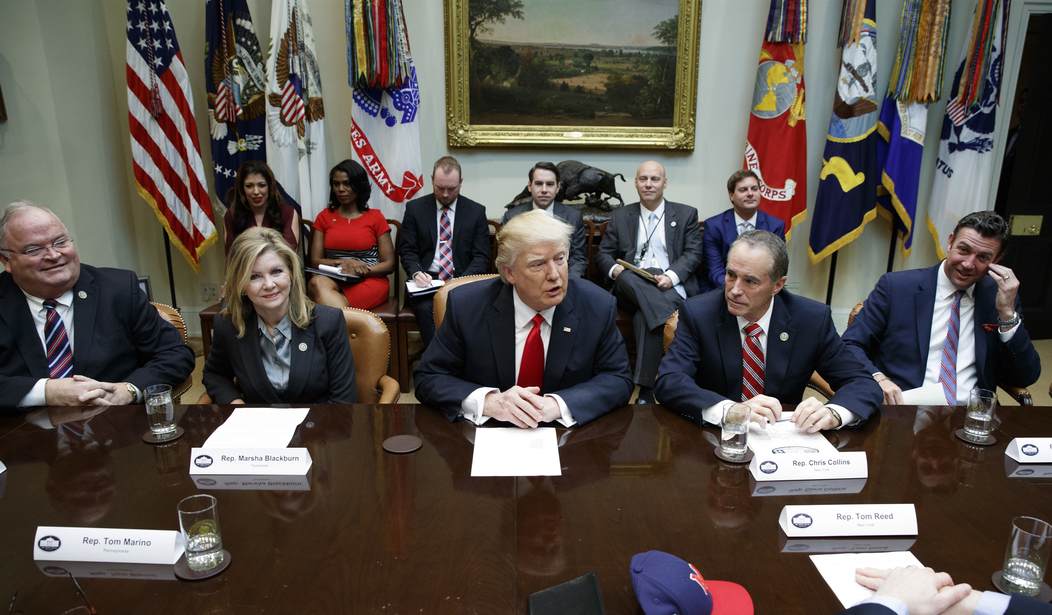It may not be exactly the coming of the Messiah, but seeing a front-page story in The New York Times about over-regulation certainly feels like a breakthrough of note. Titled "One Apple Orchard and 5,000 Government Rules," the story focuses on the Indian Ladder Farms apple orchard in Altamont, New York. A small, family-run business owned by Peter Ten Eyck, the farm does the bulk of its business in the fall (naturally). Their busy season includes sales to supermarkets, direct sales to consumers, visits from busloads of schoolchildren, and "pick your own" days. That's also the time, or it was last October, when government inspectors showed up demanding to see reams of paperwork to ensure that the farm was in compliance with immigration rules, OSHA guidelines, the Fair Labor Standards Act and other laws and regulations.
Over the course of the next several days, the family and staff had to devote about 40 hours to compiling 22 different kinds of records -- everything from vehicle registrations to insurance certificates to employee time sheets. The federal rules on ladder safety alone amount to thousands of words. "It's terribly disruptive," Ten Eyck complained.
The accumulation of regulations year after year and decade after decade at some point breaks the camel's back. As the Mercatus Center at George Mason University records, the sheer volume of federal regulations has more than tripled since 1970. When Nixon was president, the federal register contained 35.4 million words. By 2016, that had expanded to 104.6 million words. The King James Bible makes due with 783,137 words.
Is this anything for the average person to worry about? It is if you consult economist Simeon Djankov, who compiles the annual "Ease of Doing Business" rating for the World Bank. Nations that streamline regulation and keep costs down show better economic growth and lower rates of poverty than nations that do the opposite. The U.S. has slipped in the rankings from third-best country in which to do business in 2009 to seventh in 2016. Venezuela fell from 70th place in 2007 to 188th (just two above the worst nation, Somalia) in 2017.
Our bureaucratic kudzu isn't just federal. Businesses must also comply with municipal and state regulations. Steven Teles of Johns Hopkins University coined a term for this complex and overlapping system in an article for National Affairs. He called it "kludgeocracy." A kludge is apparently a computer term for "an inelegant patch put in place to solve an unexpected problem and designed to be backward-compatible with the rest of an existing system. ... You get a very complicated program that ... is exceedingly difficult to understand, and is subject to crashes." I like it because it sounds like a combination of clutter and sludge -- kludge.
Recommended
Baylen Linnekin, a food law and policy expert The New York Times consulted, said, "So many of the farmers I've spoken with tell me that stricter and stricter regulations have put many of their neighbors and friends out of business, and in doing so cost them their homes, land, and livelihoods."
Our kludgeocracy works to the benefit of the politically connected (who can lobby for special tax breaks), big companies (who can bear the costs of regulation better than smaller competitors) and grantees of hundreds of government programs who become active constituencies for their particular slice of the pie. For everyone else, the regulatory labyrinth increases costs (an estimated annual $10,000 per worker is due to regulation costs), depresses economic vitality and promotes cynicism about opportunities for reform.
President Donald Trump has made a start at paring back some federal regulations, but a full assault on the kludgeocracy will require a more comprehensive approach. It might include requiring publicly accessible cost/benefit analyses of all proposed new regulations and ongoing evaluations of older regulations for their economic impact. New rules should be examined for duplication at every level of government, and should include estimates of how much compliance will cost businesses. Regulations ought to be sunsetted after a fixed number of years. If the agency or Congress agrees that they are still needed, they can reauthorize them.
Consumers expect governments to regulate health and safety, but there are always trade-offs. The Ted Eycks may not be able to afford the new FDA regulations that are scheduled to kick in next year. The new rules, which are predicted to include more ground-water testing and other procedures, may drive more small farms out of business, leading to more produce imports from abroad. Sounds counterproductive -- or, you could say, kludgey.

























Join the conversation as a VIP Member